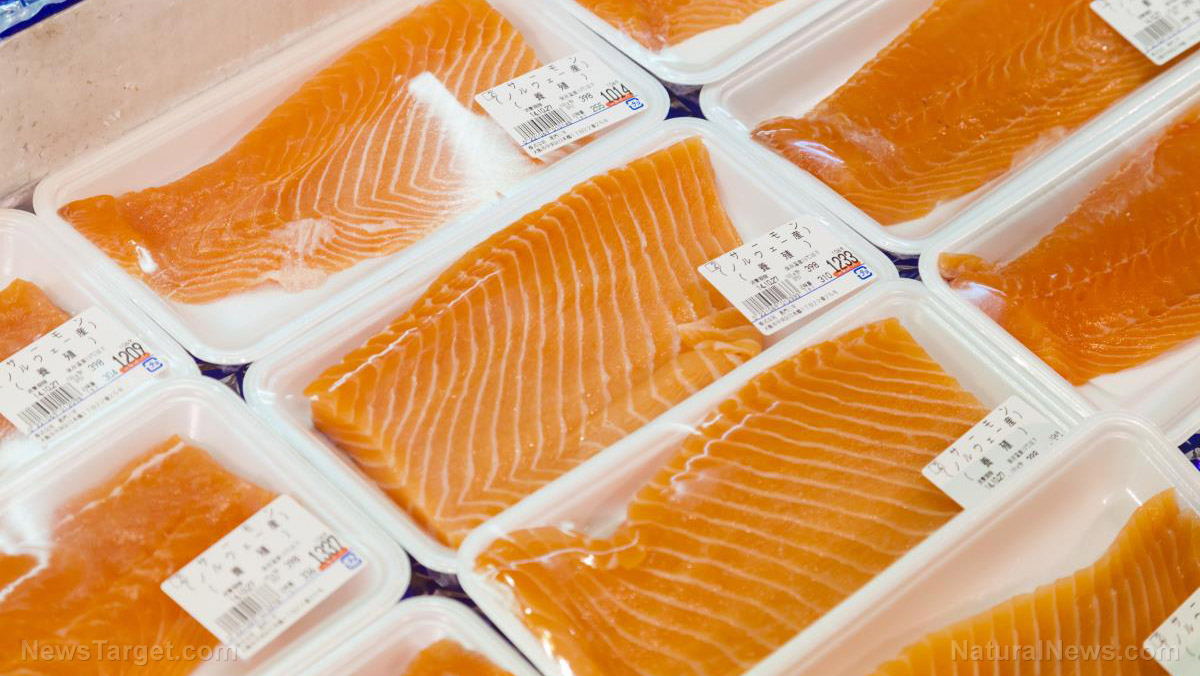Toxic farmed salmon linked to higher risk of diabetes, obesity
07/11/2022 / By Ramon Tomey

Consuming farmed salmon may increase your risk of developing metabolic disorders such as diabetes and obesity. This is according to researchers from Denmark, Norway and France, who looked at the long-term effects of farmed salmon consumption in mice. Their findings were published in the journal PLOS One.
The researchers reported that mice fed farmed Atlantic salmon fillets had accumulated fat in their bellies and that their fat tissues produced more inflammatory markers. They also found that mice given farmed salmon fillets had higher blood sugar and insulin resistance levels.
“Chronic intake of farmed fatty fish contributes to insulin resistance and obesity. Our data indicate that intake of farmed salmon fillet contributes to several metabolic disorders,” the researchers wrote in their report. (Related: How eating tilapia and salmon could be worse for your health than eating bacon.)
According to the study, healthy fats like eicosapentaenoic acid (EPA) and docosahexaenoic acid (DHA), which are found in fatty fish like salmon, have been found to address insulin resistance and cardiovascular disease. However, the presence of persistent organic pollutants (POPs) in farmed salmon counteracts their benefits.
“Farmed salmon has a much higher fat content than wild salmon, and thus has the potential to accumulate more lipophilic [or fat-loving] toxic chemicals,” said Washington, D.C.-based nonprofit Beyond Pesticides.
The researchers concurred with this and noted that: “There is emerging evidence suggesting that environmental contaminants like POPs may modulate the health effects of seafood consumption. Lipophilic POPs are mainly present in the lipid fraction of fish, and their concentrations are therefore expected to be higher in fatty fish than in lean fish.”
Bad practices, toxic chemicals contaminate salmon
According to Beyond Pesticides, improper aquaculture practices are to blame for the toxicity of farmed salmon.
“Farmed fish … use one of the most high-risk aquaculture practices – open-net pens in coastal and offshore regions. These pens allow easy exchange of waste, chemicals and parasites between the farm and the surrounding ocean environment.”
“Generally, these pens are in relatively remote areas, somewhat ‘hidden’ from public view. However, these fish live in very crowded conditions, unlike wild-caught fish.”
Such a setup, the nonprofit added, “can have a disastrous impact on marine organisms and plants, disrupting ecosystem services.”
Aside from the aquaculture setup, toxic chemicals in both fish feed and the environment are also responsible for the detrimental effects of farmed salmon. The food given to fish may contain various drugs to control pests or diseases in the farm – which has led to “widespread disease persistence and pest resistance.”
Ethoxyquin is one such chemical that contaminates farmed fishes. Salmon ingest it through fish feed, given its use as a preservative to prevent the oxidation of fatty acids from animal feeds. Humans who subsequently consume farmed salmon can ingest this food preservative developed by Monsanto in the 1950s.
Tests revealed that farmed salmon has up to 20 times higher ethoxyquin content than the allowed levels for fruits, vegetables and meat. Despite claims that ethoxyquin consumption does not affect human health, studies show that it can induce DNA damage in human cells and cause mutations.
CleanFoodWatch.com has more stories about toxic food.
Watch this documentary about toxic farmed Norwegian salmon.
This video is from the PoorSausage channel on Brighteon.com.
More related stories:
Raising farmed salmon means KILLING tons of wild fish to make fish food.
Eating polluted seafood can weaken your immune system, study concludes.
Half of farmed salmon found to be DEAF due to toxic effects of confined aquaculture.
Eating salmon can lower your risk of cardiovascular disease, but which kind should you buy?
Here’s why wild-caught is better than farm-raised salmon: It has a more diverse nutritional profile.
Sources include:
Submit a correction >>
Tagged Under:
aquaculture, clean food watch, diabetes, ethoxyquin, farmed fish, farmed salmon, food science, franken food, grocery, health science, metabolic disorders, obesity, persistent organic pollutants, products, research, toxic chemicals, toxic food
This article may contain statements that reflect the opinion of the author
RECENT NEWS & ARTICLES
COPYRIGHT © 2017 DIABETES SCIENCE NEWS




















